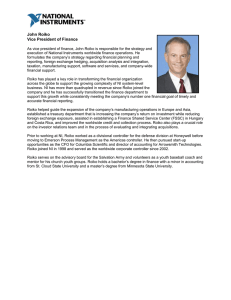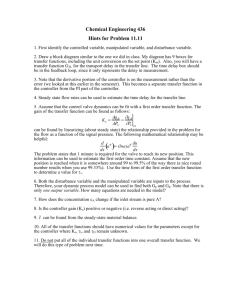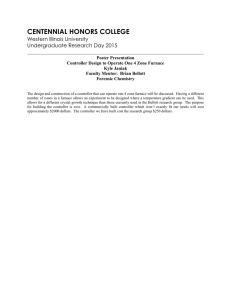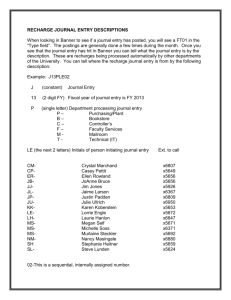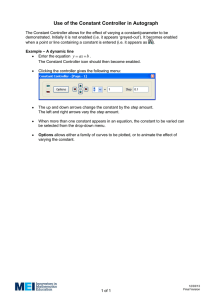CHAPTER 1: ACCOUNTING
advertisement
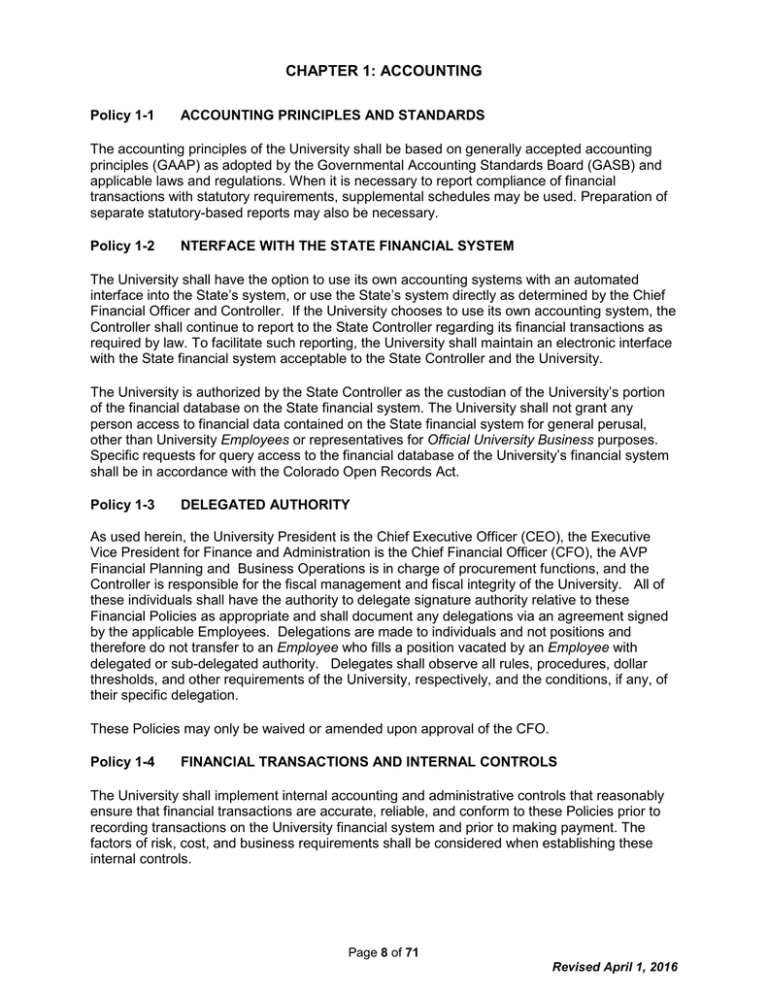
CHAPTER 1: ACCOUNTING Policy 1-1 ACCOUNTING PRINCIPLES AND STANDARDS The accounting principles of the University shall be based on generally accepted accounting principles (GAAP) as adopted by the Governmental Accounting Standards Board (GASB) and applicable laws and regulations. When it is necessary to report compliance of financial transactions with statutory requirements, supplemental schedules may be used. Preparation of separate statutory-based reports may also be necessary. Policy 1-2 NTERFACE WITH THE STATE FINANCIAL SYSTEM The University shall have the option to use its own accounting systems with an automated interface into the State’s system, or use the State’s system directly as determined by the Chief Financial Officer and Controller. If the University chooses to use its own accounting system, the Controller shall continue to report to the State Controller regarding its financial transactions as required by law. To facilitate such reporting, the University shall maintain an electronic interface with the State financial system acceptable to the State Controller and the University. The University is authorized by the State Controller as the custodian of the University’s portion of the financial database on the State financial system. The University shall not grant any person access to financial data contained on the State financial system for general perusal, other than University Employees or representatives for Official University Business purposes. Specific requests for query access to the financial database of the University’s financial system shall be in accordance with the Colorado Open Records Act. Policy 1-3 DELEGATED AUTHORITY As used herein, the University President is the Chief Executive Officer (CEO), the Executive Vice President for Finance and Administration is the Chief Financial Officer (CFO), the AVP Financial Planning and Business Operations is in charge of procurement functions, and the Controller is responsible for the fiscal management and fiscal integrity of the University. All of these individuals shall have the authority to delegate signature authority relative to these Financial Policies as appropriate and shall document any delegations via an agreement signed by the applicable Employees. Delegations are made to individuals and not positions and therefore do not transfer to an Employee who fills a position vacated by an Employee with delegated or sub-delegated authority. Delegates shall observe all rules, procedures, dollar thresholds, and other requirements of the University, respectively, and the conditions, if any, of their specific delegation. These Policies may only be waived or amended upon approval of the CFO. Policy 1-4 FINANCIAL TRANSACTIONS AND INTERNAL CONTROLS The University shall implement internal accounting and administrative controls that reasonably ensure that financial transactions are accurate, reliable, and conform to these Policies prior to recording transactions on the University financial system and prior to making payment. The factors of risk, cost, and business requirements shall be considered when establishing these internal controls. Page 8 of 71 Revised April 1, 2016 Policy 1-5 REPORTING OF FRAUD, THEFT, OR EMBEZZLEMENT The University is responsible for the design and implementation of programs and controls to prevent, deter, and detect fraud. Any suspected fraudulent misstatements of the financial statements shall be reported to the Controller. Any suspected theft or embezzlement of University funds or assets shall be handled in accordance with University’s Fraud Policies and Procedures. Policy 1-6 ACCOUNTABILITY AND CAPITALIZATION OF EQUIPMENT Each Department of the University, working with the Controller’s Office, is responsible for ensuring that all Equipment acquired by the University is properly accounted for when acquired, inventoried, and safeguarded throughout its useful life. Items with a useful life of greater than one year purchased by the University either shall be 1) capitalized, if the cost of the Equipment is $5,000 or greater, or 2) expensed in the fiscal year in which it was acquired. Each Department of the University, working with the Controller’s Office, is responsible for ensuring that all Equipment acquired by the University is properly accounted for at the time of disposal. When Equipment is ready for disposal, the department is required to contact the Controller’s Office to ensure appropriate procedures are followed. The University cannot donate any University assets to any organization. Campus departments are encouraged, but are not required, to maintain Equipment inventory lists of Equipment costing less than $5,000 that the department believes is susceptible to theft, such as computers, lab equipment, etc. If such lists are maintained, departments should review and update the inventory lists on an annual basis. Page 9 of 71 Revised April 1, 2016
